Faith and Politics

A presidential inauguration is by tradition the grandest ritual of America’s civil religion, but President Obama took the oath of office on Monday in a ceremony that was explicit in joining theology to the nation’s destiny and setting out a biblical vision of equality that includes race, gender, class, and, most controversially, sexual orientation.
Obama’s speech, his second inaugural address, repeatedly cited civic and religious doctrines — namely the God-given equality extolled by the “founding creed” of the Declaration of Independence — to essentially reconsecrate the country to the common good and to the dignity of each person.
It was a faith-infused event that recognized both the original sins as well as the later atonements of America’s history, especially on race, which was front and center as the nation’s first African-American president took the oath on the holiday commemorating the Rev. Martin Luther King, Jr.
And Obama and other speakers vividly traced the nation’s tortuous path from slavery to civil rights — from the Emancipation Proclamation 150 years ago to the March on Washington 50 years ago, the latter presided over by King.

Editor's Note: The following is a transcript of President Barack Obama's remarks following his swearing in during Monday's Inauguration ceremony.
THE PRESIDENT: Vice President Biden, Mr. Chief Justice, members of the United States Congress, distinguished guests, and fellow citizens:
Each time we gather to inaugurate a President we bear witness to the enduring strength of our Constitution. We affirm the promise of our democracy. We recall that what binds this nation together is not the colors of our skin or the tenets of our faith or the origins of our names. What makes us exceptional -- what makes us American -- is our allegiance to an idea articulated in a declaration made more than two centuries ago:
“We hold these truths to be self-evident, that all men are created equal; that they are endowed by their Creator with certain unalienable rights; that among these are life, liberty, and the pursuit of happiness.”
Today we continue a never-ending journey to bridge the meaning of those words with the realities of our time. For history tells us that while these truths may be self-evident, they’ve never been self-executing; that while freedom is a gift from God, it must be secured by His people here on Earth. (Applause.) The patriots of 1776 did not fight to replace the tyranny of a king with the privileges of a few or the rule of a mob. They gave to us a republic, a government of, and by, and for the people, entrusting each generation to keep safe our founding creed.
And for more than two hundred years, we have.
[continuted]
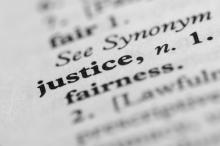
"The arc of the moral universe is long but it bends towards justice," proclaimed the Reverend Dr. Martin Luther King, Jr.
It may bend towards justice, but it does not bend gently. It bends behind sweat of the brow, creativity of the mind, and love from the soul of those who believe that every living soul not only desires justice and equality, but has a right to it. You see, justice is not a passive pursuit. The moral arc will not bend without encouragement.
Dr. King was a living example of the kind of person who encourages the moral arc of history to bend toward justice. He is also an example of the only effective way to bend that arc — non-violently. We cannot hope to bring about justice by unjust means. Might, physical confrontation, and other forms of domination will ultimately only result in nurturing an understanding that domination is an ineffective way to resolve issues of justice — and domination is the exact opposite of justice. As King says, "Hate begets hate; violence begets violence; toughness begets a greater toughness. We must meet the forces of hate with the power of love."
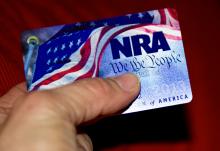
Tuesday was the 84th birthday of Rev. Dr. Martin Luther King, Jr. I don’t know about you, but I miss his words, so I offer a few. King said “people often hate each other because they fear each other, they fear each other because they don’t know each other, they don’t know each other because they cannot communicate, they cannot communicate because they are separated.” I would add to his words: ‘and in that separation they seek guns.’ As an evangelical Christian, I’m going to make this theological.
Wayne LaPierre, executive vice president of the National Rifle Association, said this as his response to the massacre of children at Sandy Hook elementary in Newtown, Conn.: “the only thing that stops a bad guy with a gun is a good guy with a gun.”
That statement is at the heart of the problem of gun violence in America today — not just because it is factually flawed, which of course it is, but also because it is morally mistaken, theologically dangerous, and religiously repugnant.

President Obama will publicly take the oath of office on two Bibles once owned by his political heroes, Abraham Lincoln and the Rev. Martin Luther King Jr. One Bible was well read, but cited cautiously, the other granted scriptural sanction to the civil rights movement.
When Obama lifts his hands from the Bibles and turns to deliver his second inaugural address on Monday (Jan. 21), his own approach to Scripture will come into view. Characteristically, it sits somewhere between the former president and famous preacher.
His faith forged in the black church, Obama draws deeply on its blending of biblical narratives with contemporary issues such as racism and poverty. But like Lincoln, Obama also acknowledges that Americans sometimes invoke the same Bible to argue past each other, and that Scripture itself counsels against sanctimony.
Obama articulated this view most clearly in a 2006 speech, saying that secularists shouldn’t bar believers from the public square, but neither should people of faith expect America to be one vast amen corner.
“He understands that you can appeal to people on religious grounds,” said Jeffrey Siker, a theology professor at Loyola Marymount University in California who has studied Obama’s speeches. ”But you also have to be able to translate your case into arguments that people of different faiths, or no faith, can grasp.”
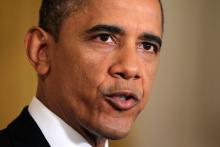
President Barack Obama and Vice President Joe Biden announced today a comprehensive plan to address gun violence in the wake of mass shootings in Newtown, Conn., and Aurora, Colo. The plan includes calling on Congress to require universal background checks, restore a ban on military-style assault weapons and 10-round limit to magazines, and implement stronger punishment for gun trafficking. The plan also includes measures aimed at increasing school safety and access to mental health services.
"This is our first task as a society: keeping our children safe. This is how we will be judged," Obama said, accompanied children who wrote to the White House calling for an end to gun violence.
In the 33 days since the Sandy Hook shooting, "more than 900 of our fellow Americans have reportedly died at the end of a gun," Obama said. "… every day we wait, that number will keep growing."
Biden, who has met with more than 200 groups representing various interests including law enforcement and people of faith, said the nation has a "moral obligation" to do everything in its power to address gun violence.
The announcement comes a day after faith leaders, including Sojourners president and CEO Jim Wallis, publicly called for many of the same measures, including reinstating the assault weapons ban, closing background check loopholes, and making gun trafficking a federal crime.
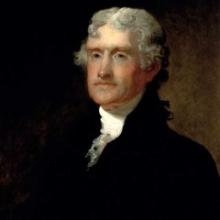
Today is Religious Freedom Day — a day to celebrate the adoption of Thomas Jefferson’s Virginia Statute for Establishing Religious Freedom. Why celebrate it?
Celebrate because our government does not use our tax dollars to propagate religion, something Jefferson found “sinful and tyrannical.” This does not mean that you have a right to stop any government action that you happen to think violates your religious beliefs — a ridiculous claim repeated during last year’s battle over insurance coverage for contraceptives.
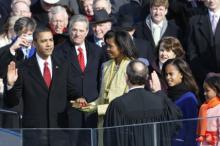
WASHINGTON — President Obama will take the oath of office with two Bibles that once belonged to a pair of civil rights icons: Abraham Lincoln and Martin Luther King Jr.
King’s “traveling Bible” was provided by his family, while the Lincoln Bible is from the Library of Congress and was used during the 16th president’s inauguration on March 4, 1861; Obama also used the Lincoln Bible during his first inauguration in 2009.
The Lincoln and King good books will be used during this year’s public swearing-in ceremony on Jan. 21, the Presidential Inaugural Committee announced. King’s Bible will be stacked atop Lincoln’s.
“President Obama is honored to use these Bibles at the swearing-in ceremonies,” said Steve Kerrigan, president and CEO of the inaugural committee. “These Bibles are rich in tradition and reflect the great American story that binds our nation.”
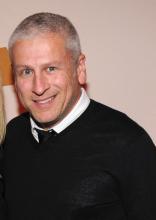
The evangelical pastor that President Obama picked to deliver the benediction at his inauguration ceremonies withdrew from the high-profile assignment on Thursday following a furor over a sermon from the mid-1990s in which he denounced the gay rights movement and advocated efforts to turn gays straight.
In a statement, the Rev. Louie Giglio of Atlanta, founder of the Passion Conferences for college-age Christians, did not directly renounce his remarks on gays but indicated that fighting gay rights is not one of his “priorities.”
Still, because of the controversy – which erupted on Wednesday after the liberal group Think Progress posted audio of the sermon – Giglio said that “it is likely that my participation, and the prayer I would offer, will be dwarfed by those seeking to make their agenda the focal point of the inauguration.”
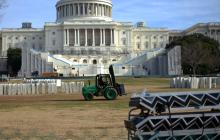
It is an odd juxtaposition, December 21, 2012 and January 21, 2013. The former date representing the “so-called” Mayan apocalypse where the usual suspects prepared for the end of the world – many of whom were Christians awaiting the second coming of Christ – and the latter date, which is the day President Barack Obama will be inaugurated for his second term.
In my estimation, this odd 21st-century connection reflects the event known as the baptism of Jesus as described in Luke 3:15-17 and 21-22. Initially we see that there is an expectation elicited by the preaching prowess of John the Baptist. The unnamed “men” wonder in their hearts if “whether perhaps he was the Christ” (Luke 3:15 RSV). John, then goes on to describe what he understands to be Christ-like qualities when he proclaims, “[One] who is mightier than I is coming, the thong of whose sandals I am unworthy to untie” (Luke 3:16).
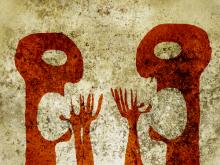
Conflict happens everywhere, from Congress to congregations, from boardrooms to bedrooms. The dysfunction of Congress is just a highly public instance of a typical conflict scenario.
I recently compiled some basics of church conflict. See if you agree with me that this playbook applies broadly.
Church conflicts – which will happen to all clergy and congregations eventually – generally focus on the clergy, just as conflict in any enterprise tends to focus on the top leader. That’s because the underlying issue usually is power – who calls the shots, who can initiate change, who can hold others accountable.
Secondary issues like specific actions, perceived performance and trust get the spotlight, but are surrogates for the power issue. People who want power don’t relish being perceived as wanting power. They prefer being seen as the aggrieved, better performers, more trustworthy, more faithful to ultimate purposes.
Church conflicts usually spring from a small group of antagonists, perhaps even a single person, who start with a conclusion, largely intuitive and emotional, and then search for reasons. Those reasons tend to be moving targets that defy better information. Deal with one reason, and two more take its place.
Antagonists, meanwhile, intimidate others into compliance, or at least silence, by making it clear they will stop at nothing to win.
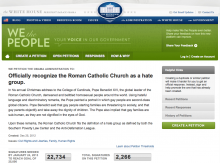
The White House’s novel online system for allowing citizens to petition the administration on any number of causes has led to various unintended consequences: petitions to secede from the U.S. following President Obama’s re-election; a petition for Vice President Joe Biden to star in a reality show; and a petition for the government to disclose its secret archives on extraterrestrials.
Now there is a petition to designate the Roman Catholic Church as a hate group for its opposition to gay rights, and it may wind up generating almost as many press releases as signatures.
The “We the People” petition was filed on Christmas Day and was prompted by Pope Benedict XVI’s Dec. 21 year-end address to Vatican administrators in which he denounced gay marriage as a threat to Western civilization.

PERHAPS NO FRAMEWORK has impacted my organization, Interfaith Youth Core, more than Marshall Ganz’s approach to public narrative (“leadership storytelling”), best articulated in his March 2009 Sojourners article “Why Stories Matter.” We use it in our trainings with college student interfaith leaders and recommend it in the workshops we do with university faculty. Most famously, it was employed by the 2008 Obama campaign.
Like all effective frameworks, there is both a visceral and a heady quality to what Ganz teaches. Stories are the way human beings understand and communicate our deepest values, Ganz says, and there are three major stories that leaders must tell. The first is the story of self. This is not a selfish activity, or even one just about self-understanding (although that is certainly a piece of it). It’s about interpreting to others your reasons for being engaged in a struggle. This helps them understand your involvement and, more important, gives them inspiration and language to get active themselves.
The second type of story is the story of us. Religions, races, ethnicities, and nations tell such stories brilliantly but often do it in a way that excludes—and makes enemies of—those outside the magic circle. The challenge for the 21st century leader is to tell a story of us that includes people of all backgrounds who are fighting for the same cause. Stories of us build community out of people who would otherwise be strangers.

“You’re a Christian? But you’re so nice!”
I’ll never forget these words, spoken to me by a friend of mine from my college’s theatre program. He was one of my more eccentric friends, more blunt than most, and he was also very openly gay. His exclamation of surprise may be the instance that I remember the most, but he certainly wasn’t the only person during my college years to express their surprise at the thought of Christians living by principles of love rather than intolerance, or at the very least, indifference.
The 113th Congress is the most diverse in U.S. history. New members include the first Hindu, first Buddhist, and the first "none." The Washington Post reports:
The new, 113th Congress includes the first Buddhist to serve in the Senate, the first Hindu to serve in either chamber and the first member of Congress to describe her religion as “none,” continuing a gradual increase in religious diversity that mirrors trends in the country as a whole. While Congress remains majority Protestant, the institution is far less so today than it was 50 years ago, when nearly three-quarters of the members belonged to Protestant denominations.
Read more here.
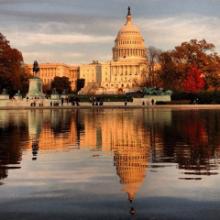
WASHINGTON — At a time when the ideals of compromise and collegiality seem like a distant dream in the nation’s capital, an unusually diverse coalition of religious leaders is asking Americans to pray for civility.
“Through daily prayer, we are calling on the ‘better angels of our nature’ needed to sustain our nation and solve problems,” said the Rev. Peg Chemberlin, immediate past president of the National Council of Churches and one of the faith leaders taking part in “18 days of Prayer for the Nation.”
Prayers began Thursday, the first day of the new Congress, and end on Jan. 21, the day of President Obama’s second inauguration.
Faith leaders from left, right and center have signed on, including Episcopal Presiding Bishop Katharine Jefferts Schori, Richard Land of the Southern Baptists’ Ethics, and Religious Liberty Commission and Richard Cizik, president of the New Evangelical Partnership for the Common Good.
The Faith & Politics Institute, a nonpartisan group that nurtures the spiritual life of members of Congress and their staffs and presses political foes toward civil debate, organized the days of prayer and an online “commitment to prayer” page to document participation.

At Sojourners, people are just getting back from their holiday breaks with their families and some will still be out this week. D.C. public schools don’t even start until next week for my two boys.
Of course, members of the Senate and the House of Representatives came back early to avoid sending the nation off of the “fiscal cliff.” For the first time in two decades, taxes were increased for the wealthiest two percent, something most Americans support. And programs the Circle of Protection seeks to protect for the most vulnerable, including important tax credits that have kept millions of Americans out of poverty, were kept safe in the final deal.
The legislators barely succeeded in coming to a compromise but largely avoided the more challenging issues of the automatic spending cuts known as “sequestration” and an agreement on long-term deficit reduction. The compromise delayed the sequester for two months, which means it will kick in around the same time as an anticipated debt ceiling fight in which Republicans say they will force the nation into default unless they get the spending cuts they want.
As reflected in this deal, I applaud the President's continued commitment to protect poor and vulnerable people. I encourage him to remain steadfast in his refusal to negotiate. However, it remains to be seen whether the President will continue on in his refusal to negotiate on such important matters with those risking our nation’s economic health to advance their own political ideology.
In November, Americans elected the first Hindu and Buddhist representatives to Congress. They represent a growing number of religious minorities who are becoming more and more visible. The Washington Post reports:
Now that Protestants are no longer in the majority – as reported in a study released by the Pew Forum on Religion and Public Life in October – even the term “religious minority” will need fresh definition in our newly minted minority-majority nation.
Read more here.
Since Vatican II American Nuns have worked to fill in the gaps of the American health care system. A new documentary chronicles how these nuns changed the Catholic Church's social justice movement. CNN reports:
"Vatican II was the spark that showed the church isn't just the hierarchy, it's the people," Fishman said. "Sisters from all over the country were inspired to work directly with those that needed their help. These faith-filled people became the most vibrant part of the church who went on to get people excited and passionate about doing God's work and creating real change."
Read more here.